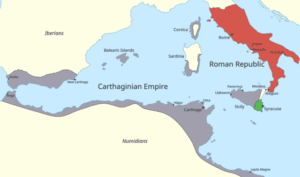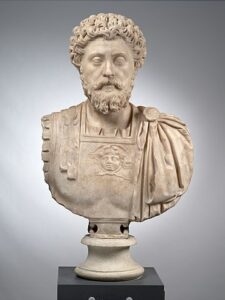Roman Rule Set the Stage
The Roman rule set the stage for the expansion of the Christian message. It conquered vast areas of the known world, leading to temporary peace throughout its kingdom This time of peace enabled the Christian message to spread throughout the known world.
According to legend, the twin brothers Romulus and Remus fought it out over the founding of Rome. Romulus eventually won after he killed his brother and became the first King of Rome in 753 BC. Initially, Rome was conquered by the Etruscans and was ruled by a series of seven Kings until 509 BC. The last king, Lucius Tarquinius Superbus, was cruel, resulting in a civilian uprising and his replacement by a series of magistrates.
Expansion of Roman Territory
The Roman territory was vastly expanded during the time of the Roman Republic. Multiple wars were fought with its neighbors to gain this expansion and territorial dominance. One of the most important of these was the Punic Wars, fought with the city-state of Carthage.

By Harrias – This file was derived from First Punic War 264 BC v2.png Changes: Adjusted Carthaginian territory in Corsica and Sardinia.Information from: Muir, Ramsay; Treharne R. F.; Fullard, Harold (1969). Muir’s Historical Atlas. London: George Philip and Son. OCLC 1090019533 p. 11, map B., CC BY-SA 4.0, https://commons.wikimedia.org/w/index.php?curid=93911131
This rival power was located at the northern tip of Africa, geographically close to Rome. Rome eventually won this series of wars from 264 to 146 BC, replacing Carthage as a dominant regional power.
The growth of Rome led to many new problems, mostly at home. The Republic system of government found itself unable to solve many chronic problems. Many of these problems were due to the politics of infighting and varying loyalties. Julius Caesar civilly defeated his political opponent Pompey and then became dictator, ending the Republic in 49 BC.
The dictatorship had many political enemies, and Julius Caesar was assassinated in 44 BC. A series of wars and intrigues followed, leading to the eventual victory of Julius Caesar’s adopted son, Octavius om 27 BC. He would later be known as Augustus Caesar and rule Rome until he died in 14 AD. During his reign, he dramatically increased the scope of the Roman Empire and initiated a time of peace known as Pax Romana.
Roman Rule Set the Stage for the Spread of the Christian Message
During the pinnacle of its influence, Rome ruled most of Europe, Asia Minor, the Balkans, the Middle East (including Israel), and the entire coast of North Africa. This area would unite under a common economic, military, and linguistic system.
If Christ appeared before 27 BC, his message might not have enjoyed the widespread displacement it had 50 years later. The widespread peace imposed by the Roman Empire ensured a proper environment to spread and hear Christ’s message.
Romans More Tolerant Than Other Conquerers
Romans tended to be more open-minded toward other civilizations they brought into the Roman Empire. Other cultures required total submission of their conquered territories, including abandoning their gods, paying taxes or tribute to their rulers, and often becoming slaves. Romans generally allowed conquered lands to retain their gods as long as they worshipped Roman gods and paid their required taxes.
Rome was more interested in maintaining peace in their conquered lands than subjugating their conquered citizens and making them slaves. They knew that giving them some autonomy would help keep them peaceful.

By Daniel Martin – Photothèque du musée Saint-Raymond, CC BY-SA 4.0, https://commons.wikimedia.org/w/index.php?curid=97131451
Jews living in Palestine were allowed to maintain their cultures and customs as long as they paid proper deference to Rome and paid their taxes (the Fiscus Judaicus. Jews resented being under the constant gaze of Roman soldiers sent there to keep the peace but, overall, were treated fairly. If the local government was too harsh in its treatment of the local population, the local rulers might be replaced to prevent a rebellion.
This relative peace lasted from 27 BC until 180 AD with the death of Marcus Aurelius – the last of the “five good Emperors.” This marked the gradual decline of the Roman Empire until Rome itself was finally conquered by the barbarians in 476 AD. This marked the collapse of civilization in the western part of the Empire, making the spread of Christianity much more difficult.
Summary of Roman Rule Set the Stage
If Christ had come to earth before 27 BC or after 180 AD, then his message have been more difficult to disseminate throughout the world. During this time, the world was experiencing “Pax Romana,” or Roman peace.
As we saw in a previous blog, the Roman Empire used Greek for commerce and communication. With Roman peace, people could communicate with each other, and the Christian message rapidly spread.
This peace was imposed upon local populations through military might and was not voluntary. The Romans were interested in peaceful local populations, so they set up a delicate balance letting the conquered people have some degree of autonomy but never letting them forget they belong to Rome. They were allowed to have their religious practices as long as they worshiped the Emperor and dutifully paid their taxes.
The importance of this peace imposed by Rome for two centuries after the ascent of Augustus Caesar can not be overestimated. This relative peace allowed commerce to flourish, made Rome rich beyond measure, and spread the Christian message throughout the known world. Paul – the great missionary to the Gentiles – was able to travel throughout the Roman Empire to spread the Christian message to all that would listen.




